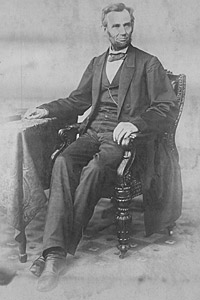 Abraham Lincoln may have been a “merely country lawyer,” as some of his critics avowed, but he had many far-reaching interactions with the U.S. Supreme Court that changed the face of jurisprudence. I’m reminded of this today because on December 6, 1864, Lincoln nominated former Treasury Secretary, and constant foil, Salmon P. Chase to be the next Chief Justice of the Supreme Court. Chase was unanimously confirmed by the Senate, and thus ended the nearly 30 year reign of the recently deceased Roger B. Taney.
Abraham Lincoln may have been a “merely country lawyer,” as some of his critics avowed, but he had many far-reaching interactions with the U.S. Supreme Court that changed the face of jurisprudence. I’m reminded of this today because on December 6, 1864, Lincoln nominated former Treasury Secretary, and constant foil, Salmon P. Chase to be the next Chief Justice of the Supreme Court. Chase was unanimously confirmed by the Senate, and thus ended the nearly 30 year reign of the recently deceased Roger B. Taney.
As much as Chase had been an irritant while sitting in Lincoln’s “team of rivals” cabinet, Taney had been a major thorn, twisting the wounds as much as he could possibly do. As Commander-in-Chief during a time of insurrection, Lincoln felt he could take drastic steps to save the Union, including the suspension of the writ of habeas corpus when necessary. Taney disagreed, and in his duel role as circuit court judge ruled against Lincoln. Lincoln ignored Taney but did get Congress to pass the Habeas Corpus Suspension Act to officially legalize his actions.
Taney’s earlier Dred Scott Decision in 1857 had an even greater impact on Abraham Lincoln’s career. This widely despised decision played center stage in the Lincoln-Douglas debates of 1858, and while Lincoln lost that Senate race on the vagaries of state-legislature-picked Senators, it set him up as the Republican party’s leader on the slavery question. In a sense, it helped make him President.
Even earlier, Lincoln had tried two cases in the U.S. Supreme Court to go along with his 175 cases pled at the Illinois State Supreme Court.
But Lincoln also had another major influence on the U.S. Supreme Court while President. The two dissenting judges on the Dred Scott case needed to be replaced (one died within weeks of Lincoln’s inauguration while the other had quit the court in disgust after the Dred Scott decision). One of the majority judges in the Dred Scott case also needed replacement; he quit the court after Lincoln’s inauguration and became the Confederate Assistant Secretary of War. So Lincoln filled three Supreme Court judgeships with Noah Haynes Swayne, Samuel Freeman Miller, and David Davis.
Ah, but this is where it gets interesting. The U.S. Constitution grants Congress the power to determine how many Supreme Court justices will sit. That number had ranged from five to nine during our history, but Congress decided to deal with the many leftovers from the Dred Scott case by adding a tenth justice. Lincoln thus was able to appoint an extra new justice to the court, which he did in 1863 with Steven Johnson Field. It should be noted that Congress, in order to keep Lincoln’s successor, Andrew Johnson, from appointing pro-slavery justices to the court, reduced the number of justices down to seven. Immediately after Johnson was out of office, Congress reset the number once again to nine, so since 1869 that number has been the standard up to today.
With Salmon P. Chase’s appointment as Chief Justice, Lincoln put a total of five judges on the Supreme Court, one of the most prolific appointer-in-chief in our history.
David J. Kent is an avid science traveler and the author of Lincoln: The Man Who Saved America, in Barnes and Noble stores now. His previous books include Tesla: The Wizard of Electricity and Edison: The Inventor of the Modern World and two specialty e-books: Nikola Tesla: Renewable Energy Ahead of Its Time and Abraham Lincoln and Nikola Tesla: Connected by Fate.
Check out my Goodreads author page. While you’re at it, “Like” my Facebook author page for more updates!










